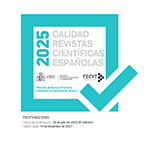The Spanish Communist Party, Santiago Carrillo: January 1977, or the sacrificial turning point in the Spanish Transition to Democracy
Abstract
The Spanish Transition to democracy has originated one of the most solid narratives built by the press in recent History. Its turning point is represented by the acts of violence that spread in Madrid during the socalled ‘black week’ (end of January 1977). Its apex was the massacre of a group of communist lawyers by fascist gunmen. This articles analyzes different layers in the buildingup of this event: a chapter of the TV series La Transición (Elías Andrés, Victoria Prego, 1995), the film Siete días de enero (J.A. Bardem, 1978), a reportage published by the magazine Interviú (February 1977), and the chronicle made by the journals El País, Diario16 and the communist Mundo Obrero. All over the article, the emphasis is put on Santiago Carrillo, the communist leader who managed to handle the situation reaching his party’s legalization only two months later.Downloads
Article download
License
In order to support the global exchange of knowledge, the journal Estudios sobre el Mensaje Periodístico is allowing unrestricted access to its content as from its publication in this electronic edition, and as such it is an open-access journal. The originals published in this journal are the property of the Complutense University of Madrid and any reproduction thereof in full or in part must cite the source. All content is distributed under a Creative Commons Attribution 4.0 use and distribution licence (CC BY 4.0). This circumstance must be expressly stated in these terms where necessary. You can view the summary and the complete legal text of the licence.










